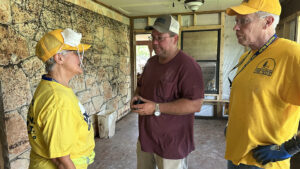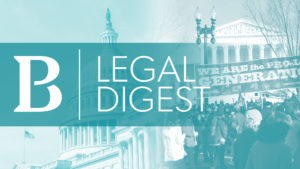
McMINNVILLE, Ore. (BP)–Thirty years ago this month abortion was made legal in the United States. The result: Not only have millions of children not been given the opportunity to take their first breath, but evidence abounds that the sanctity of human life has diminished greatly in the three decades since government legitimized the killing of unborn children.
In 1964 New Hampshire became the first state to sponsor a lottery since lotteries were abolished in 1894. Almost 40 years later and the vast majority of states have followed the Granite State’s lead. The result: Millions of hard-working citizens have been enticed to play a game of chance where the odds of winning are astronomical, and state-sponsored gambling has served to undermine the value of saving and sound investing among its citizens.
Concerning legalized gambling, longtime news anchor Walter Cronkite once commented, “A nation once built on a work ethic embraces the belief that it’s possible to get something for nothing.” Recent studies prove Cronkite’s observation to be correct. A poll conducted in 1999 by the nonprofit Consumer Federation and the financial services firm Primerica revealed that 51 percent of people in households with incomes of $35,000 or less are firmly convinced they have a better chance of becoming financially secure by investing in a lottery than by any other means.
It is clear that the long-term effect of the government sanctioning any activity is the attitude citizens eventually adopt toward the said activity. The killing of the unborn, once considered reprehensible to a majority of Americans, is now approved by approximately half of the population. Similarly, gambling once frowned upon, is now accepted and embraced.
Once upon a time churches in America took firm principled stands against what they deemed were moral wrongs. Pastors took the lead and spoke out because they believed activities like abortion and gambling were not only inherently wrong, but they also understood the implications of the state legitimizing a morally subversive activity. In the short term, individuals would be damaged, but in the long term it would be all of society that would suffer.
Currently three churches and one religious charity have the opportunity to be what Martin Luther King Jr. deemed “the conscious of the state.” Right now the charity seems to be the only one of the four willing to take a stand and fulfill King’s mandate.
Two men, one in West Virginia and the other in Florida, have both won significant lottery jackpots. Both have indicated a desire to give huge donations to religious organizations. The West Virginian plans to give to three churches. The Florida man has already attempted to give a portion of his winnings to the Salvation Army at Naples, Fla.
The Salvation Army turned down a $100,000 gift from the Florida lottery winner because they did not want to receive money associated with gambling. A spokesman for the Salvation Army said, “There are times when Major Damon (head of the Salvation Army in Naples) is counseling families who are about to become homeless because of gambling. He really believes that if he had accepted the money, he would be talking out of both sides of his mouth.”
All indications are that the three churches, two in West Virginia and one in California, will not follow the Salvation Army’s lead. It seems that each pastor is more than willing to accept the winnings from state-sponsored gambling. One pastor’s comment on the prospect of receiving some of the lottery winner’s tithe, “All of us are going to be winners….” So much for firm principled stands.
I applaud the Salvation Army for doing the right thing. They have spoken volumes to those they are trying to help achieve responsible lives. In the short term they might take some societal heat, but in the long term they will enjoy a tremendous amount of credibility in their community.
If more churches would follow the example of the Salvation Army of Naples, who knows, perhaps we wouldn’t have millions of babies slaughtered each year and people trusting in the lottery for financial security.
–30–
Boggs is pastor of Valley Baptist Church, McMinnville, Ore.















